Text
Of Loving Grace
Culture, Spirit, and Community Love
We held a Protestant quinceañera service this month for our darling quinceañera. The ritual is becoming more commonplace in the northern US, as many move up from south of the border. Many are also diverging from the Catholic Mass. Protestants need guidance for the cultural continuation of a social and religious celebration that has origins in Catholicism.
We appreciate our church family celebrating with us, and our pastor honoring our request to explore this church service with us. The original program was created by our previous pastor six years before for our firstborn daughter, and our current pastor altered it only slightly. We thank them both for pioneering a confirmation-style worship service for a family that is one generation removed from Mass. What was the purpose of a service that offered no sacrament? Praise. Love. Thankfulness. Recognition of a Triune God who brought us together in the past, sits with us in the present, and promises to be with us in our futures.
We gathered together to praise God and thank God for our daughter, who wore a crown representing her ongoing relationship with, and our recognition of, Christ the King, our sibling and savior. Together with our church family and dear friends and family who gathered from across the country, we prayed, praised, read the Word, and sang hymns before finishing the day with a party. We ask the Spirit to guide us, always.
Below is the program we used. I offer it here for others to use as a model, as we also sought models for Protestant services:
Saturday, May 11th, 2024
Organ Prelude
Processional: Quinceañera and Damas
Welcome
Responsive Call to Worship: Psalm 139:1-18, 23-24 See Bulletin Insert (reproduced below)
Salutation and Prayer
Hymn of Praise No. 64 (Green Hymnal) “All Creatures of Our God and King”
Ritual of Friendship
The Law of God
Gloria Patri
Hymn No. 395 (Green Hymnal) “Teach Me Thy Way, O Lord”
Gospel Lesson: Luke 1:26-56, 2:41-51
Homily: “Was Calvin’s Mother Mary?”
Recognition of Sponsors
Testimony of Quinceañera
Prayer of Blessing
Presentation of The Tiara
Closing Prayer
Hymn No. 435 (Green Hymnal)
“What a Friend We Have in Jesus”
Benediction
Responsive Call to Worship:
Leader: You have searched me, Lord,
and you know me.
You know when I sit and when I rise;
you perceive my thoughts from afar.
People: You discern my going out and my lying down;
you are familiar with all my ways.
L: Before a word is on my tongue
you, Lord, know it completely.
You hem me in behind and before,
and you lay your hand upon me.
P: Such knowledge is too wonderful for me,
too lofty for me to attain.
L: Where can I go from your Spirit?
Where can I flee from your presence?
If I go up to the heavens, you are there;
if I make my bed in the depths, you are there.
P: If I rise on the wings of the dawn,
if I settle on the far side of the sea,
even there your hand will guide me,
your right hand will hold me fast.
L: If I say, “Surely the darkness will hide me
and the light become night around me,”
even the darkness will not be dark to you;
the night will shine like the day,
for darkness is as light to you.
P: For you created my inmost being;
you knit me together in my mother’s womb.
I praise you because I am fearfully and wonderfully made;
your works are wonderful,
I know that full well.
L: My frame was not hidden from you
when I was made in the secret place,
when I was woven together in the depths of the earth.
P: Your eyes saw my unformed body;
all the days ordained for me were written in your book
before one of them came to be.
L: How precious to me are your thoughts, God!
How vast is the sum of them!
Were I to count them,
they would outnumber the grains of sand—
when I awake, I am still with you.
P: Search me, God, and know my heart;
test me and know my anxious thoughts.
See if there is any offensive way in me,
and lead me in the way everlasting.

#duke divinity#duke#reformed#church#notre dame fighting irish#christianity#faith#christian faith#quinceañera#quinceanera dresses
0 notes
Text
Of Loving Grace
The Examen Series Finale
My deep dive into giving the Ignatian Examen prayer one more try was, well, a flop regarding the stated goal of deepening my connection with God. I had to make a statement for my learning covenant, and I chose that one. We were pretty tight already, so my final thoughts on keeping the practice for myself are "meh." However, I can now offer this practice to any who are seeking a new way of praying, so I'm grateful for the newfound familiarity.
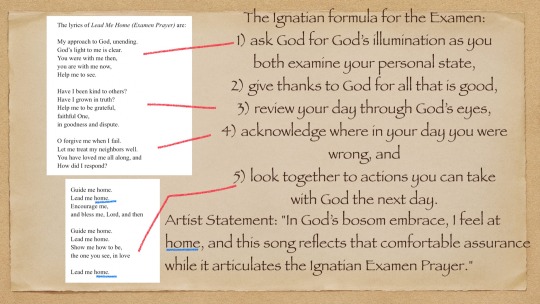
On the other hand,
I morphed this practice into music. While I did maintain the covenant by faithfully engaging in this practice daily, I didn't want to end this term without creating a project related to the Examen experience. You can see and hear my music here
youtube
and here
youtube
and here:
You may use the music as you read the lyrics to pray. You may freely use the music in worship, either by streaming the accompaniment or by downloading the sheet music.
#duke divinity#duke#art#reformed#church#notre dame fighting irish#youtube#christian faith#piano music#music#examen#composer#faith#faith in jesus#faith in god#faithinchrist
0 notes
Text
Of Loving Grace
Here is the final sermon in the mini-series on covenants with God; youth sermon, readings, sermon, and prayer.
Youth
So, surprise! Not every word is written out for this one! You can read mine and jump off into your own meditation. You could also purchase the same curriculum I'm using. It's great, it follows the Revised Common Lectionary, and it is available for all church sizes and budgets. I'm a fan. But you can just take inspiration from these pictures, if a full-blown curriculum is not on your radar today.
Second Sunday of Lent, February 25, 2024

If you have time, you can add this four-part meditation.
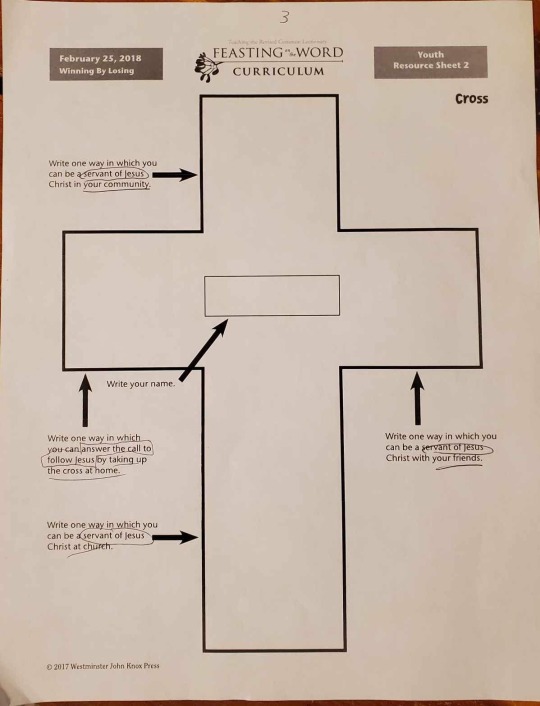
Scripture
First Reading Genesis 17:1-7, 15-16
1When Abram was ninety-nine years old, the LORD appeared to Abram, and said to him, “I am God Almighty; walk before me, and be blameless. 2And I will make my covenant between me and you, and will make you exceedingly numerous.” 3Then Abram fell on his face; and God said to him, 4“As for me, this is my covenant with you: You shall be the ancestor of a multitude of nations. 5No longer shall your name be Abram, but your name shall be Abraham; for I have made you the ancestor of a multitude of nations. 6I will make you exceedingly fruitful; and I will make nations of you, and kings shall come from you. 7I will establish my covenant between me and you, and your offspring after you throughout their generations, for an everlasting covenant, to be God to you and to your offspring after you.”
15God said to Abraham, “As for Sarai your wife, you shall not call her Sarai, but Sarah shall be her name. 16I will bless her, and moreover I will give you a son by her. I will bless her, and she shall give rise to nations; kings of peoples shall come from her.”
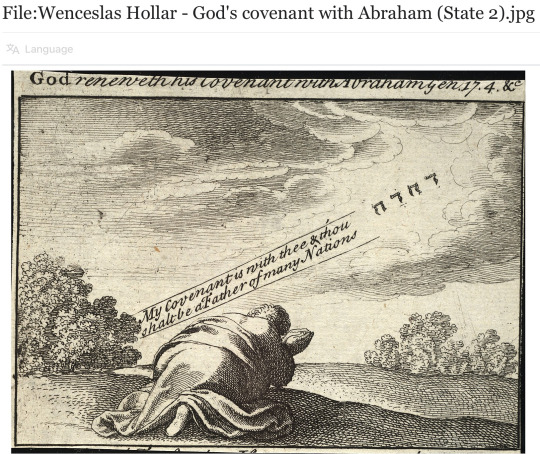
Second Reading, Paul’s letter to the Romans 4:13-25
13For the promise that he would inherit the world did not come to Abraham or to his descendants through the law but through the righteousness of faith. 14If it is the adherents of the law who are to be the heirs, faith is null and the promise is void. 15For the law brings wrath; but where there is no law, neither is there violation.
16For this reason it depends on faith, in order that the promise may rest on grace and be guaranteed to all his descendants, not only to the adherents of the law but also to those who share the faith of Abraham (for he is the father of all of us, 17as it is written, “I have made you the father of many nations”) — the presence of the God in whom he believed, who gives life to the dead and calls into existence the things that do not exist. 18Hoping against hope, he believed that he would become “the father of many nations,” according to what was said, “So numerous shall your descendants be.” 19He did not weaken in faith when he considered his own body, which was already as good as dead (for he was about a hundred years old), or when he considered the barrenness of Sarah’s womb. 20No distrust made him waver concerning the promise of God, but he grew strong in his faith as he gave glory to God, 21being fully convinced that God was able to do what he had promised. 22Therefore his faith “was reckoned to him as righteousness.” 23Now the words, “it was reckoned to him,” were written not for his sake alone, 24but for ours also. It will be reckoned to us who believe in him who raised Jesus our Lord from the dead, 25who was handed over to death for our trespasses and was raised for our justification.

Faith (1864)
Freeman Gage Delamotte (English, 1813–1862)
Our Gospel reading from Mark 8:31-38
31Then he began to teach them that the Son of Man must undergo great suffering, and be rejected by the elders, the chief priests, and the scribes, and be killed, and after three days rise again. 32He said all this quite openly. And Peter took him aside and began to rebuke him. 33But turning and looking at his disciples, he rebuked Peter and said, “Get behind me, Satan! For you are setting your mind not on divine things but on human things.”
34He called the crowd with his disciples, and said to them, “If any want to become my followers, let them deny themselves and take up their cross and follow me. 35For those who want to save their life will lose it, and those who lose their life for my sake, and for the sake of the gospel, will save it. 36For what will it profit them to gain the whole world and forfeit their life? 37Indeed, what can they give in return for their life? 38Those who are ashamed of me and of my words in this adulterous and sinful generation, of them the Son of Man will also be ashamed when he comes in the glory of his Father with the holy angels.”
This is the Word of the Lord.
Thanks be to God.

Sermon
Today is the second Sunday in Lent. I will remind you that Sunday’s are little Easters because every Sunday we celebrate the risen Christ, so Sundays are not part of the 40 days of Lent. As an aside, that is why some Christian churches do not celebrate Easter or Resurrection Sunday as a holiday because we do celebrate the risen Christ every time we worship together. Today, on our sabbath day that we are keeping holy, we praise God for our mediator, the risen Christ. So, today, Sunday, not Lent.
But, for the rest of the week according to our church calendar, we are journeying with Christ on his way to the cross. This is a solemn time for reflection. On that journey, we are reminding ourselves of why and how we are part of God’s people, so that, come Easter Sunday, we can truly understand how you and I are personally involved and able to proclaim “He is risen!”
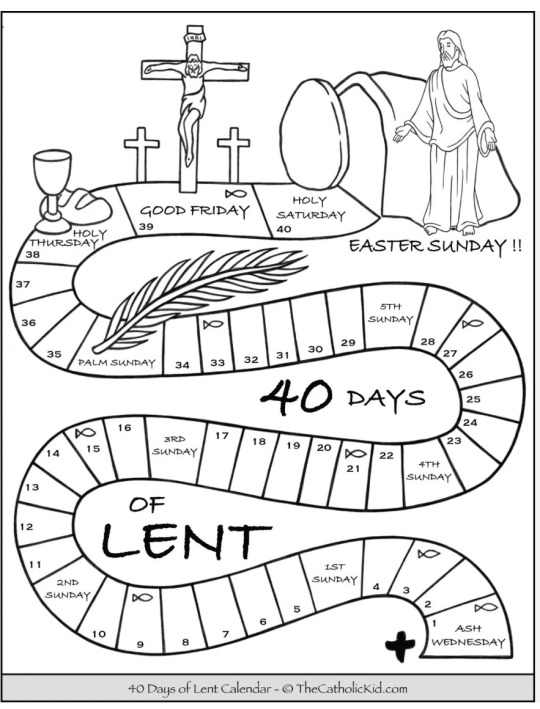
Last week, most of us read about the first covenant between God and God’s people, as we heard the story of Noah after the great flood. I served in Glenmont last week and I’m pretty sure they were sick of me saying the word “covenant.” I really hammered it home. We read that God placed the rainbow in the vast sky facing away from the people and we can see that symbol as God’s self-limiting protection of Creation, which includes us (imagine an archer’s bow pulled back to shoot). The focus of this first covenant was the fullness of creation -- all creatures in the world are in a contractual agreement under God’s protection.
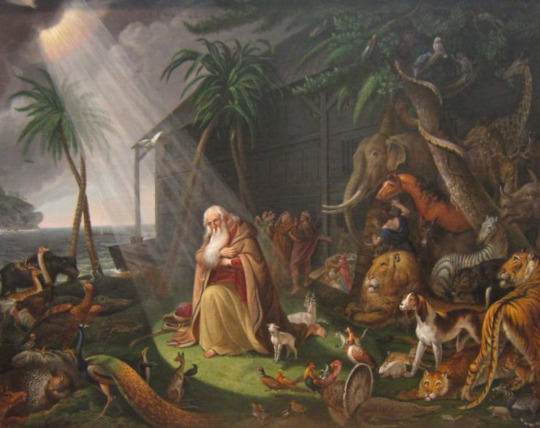
Charles Willson Peale: Noah and his ark / WikimediaCommons
In our reading from Genesis today, we read of the second great covenant between God and God’s people, shown here in God’s promise to Abram that his family line would extend to many nations -- a symbol of great blessings. Our reading skipped over the physical sign of the covenant -- circumcision of males, which was a sign that covered all people in the household, male and female, and pointed to the promise of fruitfulness and blessing. Our reading today did include the name changes of Abram to Abraham and from Sarai to Sarah. The new names mark the passage from a previous state to a new, covenantal state. In today’s terms, we understand the changing of names in the context of married couples who change their name to signify their new life and the agreement they have made to live as one family, or in the context of our trans siblings who change their names in order to step into a more comfortable personal space. Sometimes, we even change our names from a childhood calling to a more “adult” name, such as when Robbie becomes Robert, and Sissy becomes Cecelia. We understand the symbolism of a name change -- it isn’t random, and it has deep meaning.
Let’s recap a little bit: so far on this Lenten journey to the cross, we’ve been reminded that God promised to protect creation. This protection means that all of creation was not only pronounced good, but it was pronounced saveable and worthy of continuation. The world, and God’s creation which includes humanity, will continue.
We’ve also been reminded that God promised that we will thrive as we stay in covenant with our Creator. Remember, “covenant” implies a contract with more than one party. God is in covenant with us, not over us or separate from us. We are in relationship with God. God is with us. Emmanuel, right? It was just two months ago that we were singing that!
youtube
So, creation will continue, and God is with us. These promises are given in a two-party relationship of faith. This leads us right into today’s New Testament reading from Romans 4:13-16:
“13For the promise that he would inherit the world did not come to Abraham or to his descendants through the law but through the righteousness of faith. 14If it is the adherents of the law who are to be the heirs, faith is null and the promise is void....
16For this reason it depends on faith, in order that the promise may rest on grace and be guaranteed to all his descendants, not only to the adherents of the law but also to those who share the faith of Abraham.”
Paul reminds us that Abraham’s faith in God’s promises was not just for himself, but for us, his heirs in faith. In faith, the promise of God is not void. In faith, the promise of God rests on Grace, and God’s grace is revealed to us through Jesus Christ.
Our gospel reading today shows Jesus really putting his disciples to the test. They know the story of Noah. They know about Abraham. And they know, from the very mouth of Jesus, about God’s true call to faith. They have been showing love to all they meet, feeding thousands, healing the sick, listening to the outcasts, and studying the law of God through the direct teachings of the Messiah.
At this point in Mark’s gospel, Jesus is probably tired. He issues his rebuke to Peter to “Get behind me, Satan” -- to stop with the platitudes. Jesus doesn’t want Peter’s “thoughts and prayers,” his distracted and ineffectual dismissal of what Jesus is saying. Jesus wants Peter, and us, to focus on the deeper, divine meaning behind his words. Jesus wants Peter, and us, to listen as Jesus describes the new covenantal state we will enter with God after Jesus suffers, is rejected, killed, and rises again on the third day.
Jesus foretells his own manner of death as he tells the crowd to take up their crosses and follow him. We think, “Oh, Christianity, crosses -- there’s a nice piece of architecture or there’s a nice necklace. What a lovely cross.” Crosses were known to the crowds listening to Jesus. Crosses were a Roman instrument of torture. Torture was everyday life and you didn’t want a cross. But Jesus willingly walked that path, and he told them, if they would only listen, that a path that includes faithfulness to the promises of God also includes witness to Jesus’s return “in the glory of his Father with the holy angels.”
Our lessons today from the scriptures teach us that God promises us continuation, faithfulness, and justification through unfathomable grace that saves us in Heaven. We’ll end here with this: Paul says this to us in Romans, that God’s promises “It will be credited, or our text said “reckoned,” to us who believe in the One who raised Jesus our Lord from the dead, who was handed over to death for our trespasses, and was raised for our justification.” We are in covenant with God, because we believe.
Let us Pray:
O God, grant that we may stand in your grace. Grant that the light of your grace may come to us through your Word. Keep us firm in faith until the promised time when your redemption shall come to all. We sometimes ask if we can bear the hard times in our lives. We call on your promises to steady us. Help us to listen to your Word. Help us to turn to you, the One who knows the hour when we may see the promised day. In the name of our sibling and our mediator, Jesus Christ, Amen.
#duke divinity#duke#art#reformed#church#notre dame fighting irish#youtube#christian faith#appalachia#appalachian culture#bluegrass#orthodox christianity#orthodox church
0 notes
Text
Of Loving Grace
Word of the day: Covenant
I am deviating from my exploration of visual and aural art to share this sermon mini-series -- a dive into the art of preaching. What follows is a youth sermon, the readings, and a sermon and prayer for the first Sunday of Lent.
Youth
[Before beginning, I distributed shakers and bells to the youth. Unfortunately, that day only adults attended, so I walked among them and asked for volunteer children. I found many! Adults without shakers or bells were invited to use jazz hands or to use ASL for “excited!” or “yay!” when I said the word “Alleluiah.”]

Welcome friends. Brr, it’s cold out today. Can you tell me what season we are in? Winter! Winter will end next month, but we are definitely in the middle of winter right now. We know all four season? Fall, spring, summer, winter. Do you have a favorite, or do you like them all?
Most Christians around the world also follow a church calendar which has different seasons. The church seasons are Advent before Christmas, then Christmas season, after that we have ordinary time, Lent, Easter season, and then ordinary time, again, in the summer. This last Wednesday, we entered the season of Lent. It’s kind of a sad and quiet season because we are preparing our hearts to think about how Jesus died before he came back from the dead. When someone dies, it is sad and we do miss them. But, we have hope that the sad time does not last forever and that we will live with God. The reason we have that hope is because of Easter! On Easter, we celebrate Jesus rising from the dead! Not only did he die then come back, Jesus kept teaching us about God, and now he still lives at the right hand of God. Easter is a happy time for the church! We say Alleluiah! (shake bells)
Here is a quick fact: Sundays are not part of the quiet season of Lent. On Sundays, we all come together to celebrate that Jesus, God’s son, was alive after he died and sits at the right hand of God. That makes each Sunday a little Easter. Today, like every Sunday, is a celebration! Even though the rest of the week is in the church season of Lent, today is the day we come together to thank God for loving us, and for sending Jesus to teach us about that love. And we all say, “Alleluia!” (shake bells)
Let’s pray together: Dear God (Dear God), thank you for loving us. Thank you for loving us when we’re sad. Thank you for sending Jesus to teach us. Amen.
Scripture for Feb. 18, 2024
First Reading Genesis 9:8-17
8Then God said to Noah and to his sons with him, 9“As for me, I am establishing my covenant with you and your descendants after you, 10and with every living creature that is with you, the birds, the domestic animals, and every animal of the earth with you, as many as came out of the ark. 11I establish my covenant with you, that never again shall all flesh be cut off by the waters of a flood, and never again shall there be a flood to destroy the earth.”
12God said, “This is the sign of the covenant that I make between me and you and every living creature that is with you, for all future generations: 13I have set my bow in the clouds, and it shall be a sign of the covenant between me and the earth. 14When I bring clouds over the earth and the bow is seen in the clouds, 15I will remember my covenant that is between me and you and every living creature of all flesh; and the waters shall never again become a flood to destroy all flesh. 16When the bow is in the clouds, I will see it and remember the everlasting covenant between God and every living creature of all flesh that is on the earth.” 17God said to Noah, “This is the sign of the covenant that I have established between me and all flesh that is on the earth.”
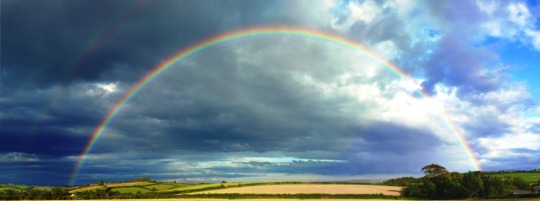
License: CC0 Public Domain
Anna Langova has released this “Rainbow” image under Public Domain license. It means that you can use and modify it for your personal and commercial projects.
Second Reading 1 Peter 3:18-22
18 For Christ also suffered for sins once for all, the righteous for the unrighteous, in order to bring you to God. He was put to death in the flesh, but made alive in the spirit, in which also he went and made a proclamation to the spirits in prison, who in former times did not obey, when God waited patiently in the days of Noah, during the building of the ark, in which a few, that is, eight people, were saved through water.
21And baptism, which this prefigured, now saves you — not as a removal of dirt from the body, but as an appeal to God for a good conscience, through the resurrection of Jesus Christ, who has gone into heaven and is at the right hand of God, with angels, authorities, and powers made subject to him.
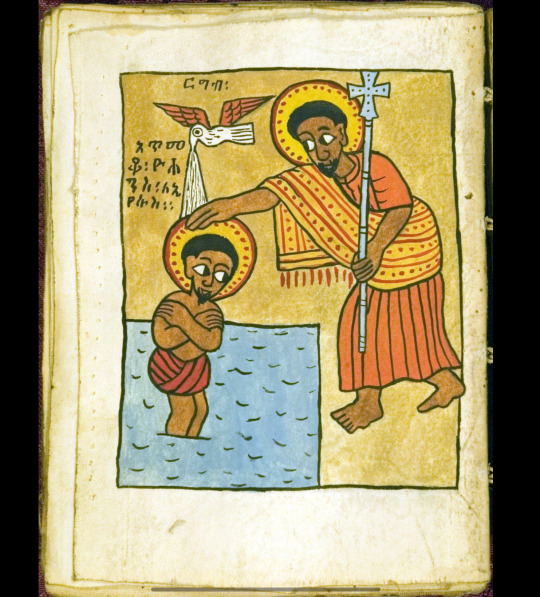
Baptism of Christ, Ethiopian Biblical Manuscript (20th Century) - Public Domain Orthodox Painting - Shalone Cason
Shalone Cason, January 7, 2023
Gospel of Mark 1:9-15
9 In those days Jesus came from Nazareth of Galilee and was baptized by John in the Jordan. 10 And just as he was coming up out of the water, he saw the heavens torn apart and the Spirit descending like a dove on him. 11And a voice came from heaven, “You are my Son, the Beloved; with you I am well pleased.”
12 And the Spirit immediately drove him out into the wilderness. 13 He was in the wilderness for forty days, tempted by Satan; and he was with the wild beasts; and the angels waited on him.
14Now after John was arrested, Jesus came to Galilee, proclaiming the good news of God, 15 and saying, “The time is fulfilled, and the kingdom of God has come near; repent, and believe in the good news.”

©tonktiti at stock.adobe.com
Sermon
This week’s readings contain a lot of symbolism, don’t they? We have rainbows, water that washes away sinners in the flood, water that washes away our sins in baptism being demonstrated by the baptism of Jesus who was sinless, and we have wild beasts in the wilderness. We also see convenental language, and by that I mean words and phrases for each symbol that signal to us a contractual relationship. These symbols really drive home an understanding of God’s connection with us, and God’s promises for us.
These readings are right up my alley. Thanks for asking me to be here today! This is a great week for me, and I hope, for you! (Woo!)
Does that sound odd, in the beginning of Lent, to be celebrating? We did talk earlier about how Sundays are Little Easters within the Lenten season. I would say that the solemn season of Lent moves us toward the celebration of resurrection and God’s ultimate covenant, and for that we can be excited!
Last Sunday, many of us read about the transfiguration on the mountain, where the radiance of Jesus nearly blinds James and Peter while they are surrounded by the cloud from which they hear the voice of God the Father.
This week, we read about the arch of light -- the rainbow-- that is set by God within the clouds in the vast sky, a symbol so large that Noah’s vision is filled with a sign he and God can see.
Friends, God’s magnificence radiates to us and we can’t miss it. God’s majesty reaches us in the clouds, in the light, on the mountains, in all of creation, in times when we are terrified of what we witness, and in times of storms that seem unending. God entered into relationship with creation and chose to limit God’s divine and majestic power to be in relationship with us. We see God choosing to limit divine power in 2 of our readings; in the covenant promise of the rainbow and in the presence of Jesus Christ who comes to us in a limited human body - a body that now walks through Lent toward the cross.
Let’s look at this symbolism a bit more. I want to share with you a Sunday School story for today that I’ve borrowed from Feasting on the Word curriculum in 2017. The story is called, “Rainbow People.”
“One day, a young mother was taking a walk with her small son and they saw a rainbow. The four-year-old boy looked up in wonder and said, ‘Mommy, can we take that home and put it in our house?’ His awestruck question prompted the mother to write a poem she titled, ‘A Rainbow in My House.’ She took her son’s question literally, imagining what it would be like to have a rainbow in their house, on their walls, emanating from the windows and doors, coming out the chimney. The house was transformed, and it could not contain the glory of the rainbow and its colors.”
youtube
We can’t miss it, we can’t avoid it. God’s covenant with Noah and with us radiates into every part of creation, including into us, into our very being.
What does that mean for you and me? Take that question home and wrestle with it if you need to, but don’t dismiss it. What does it mean for you, for your life and your mental health and for your inner soul, that God’s promises and God’s being radiates through creation and includes you?
Maybe you don't want to meditate on that -- some of us need to have it laid out for us. Just give it to me straight - level with me, Doc. You know what I mean? For those of you who want a straightforward answer, here it is: You are wonderful.
Yep. Even if you yelled at your kids or your dog this morning, and even if you had a bad shift at work, or if you flipped someone the bird on the road this week, or if you are watching on zoom from a prison cell. You, my friends, are part of creation. God has made a covenant with you and placed his open bow facing away from you and all parts of the earth so that you will be protected.
Scholar Dianne Bergant, in Exegetical Perspective, writes that the flood narrative is a story of deliverance and of relationship with God. The covenant is made with all of creation. Bergant’s word, “deliverance,” signals for us protective language.
The symbol of the rainbow in this story signifies the first covenant between God and God’s people. Our call to worship today was taken from Psalm 25 which refers to another covenant between God and God’s people, when the people left Egypt to follow the path God set them on. God’s promises continue and are everlasting, from generation to generation.
I will continue this look at why you are wonderful, and how God is faithful to God’s covenants, but first, let’s move quickly to Mark. Our gospel shows that, in Jesus’s baptism, Jesus willingly enters the “renewal movement” (Oxford Bible, p. 1793) begun by John to prepare God’s people for Jesus’s presence. At the end of our reading today in verse 15, Jesus proclaims the Good News of God and asks the people to turn to God and believe. In our reading, the word used is “repent,” but that’s what repent means, to turn. It doesn’t mean to embroil yourself in agony and guilt, and to then beg for mercy. That seems to be a common, modern understanding of the word. Actually, repent means to re-align yourself, to turn to God whose mercies are new every morning (does that sound familar? It’s a verse from the Old Testament in Lamentations).
Jesus, as the good news himself, has come to remind us of God’s covenants. We are to remember that God made a promise to us in a covenental way -- like a contract with two parties - God and creation, including us. Jesus says that the time is fulfilled and that the kingdom of God is near.
We see more protective language in our gospel reading, but we have to look a little harder. In Mark, we see that Jesus is pushed to the wilderness, i.e. away from God our protector, and is tested with struggles and dangers like Satan and wild beasts. The language of Mark here refers us back to Psalm 7 and Psalm 91, prayers of the people seeking God’s protection from evils represented by wild animals. Jesus, according to Mark, personally acts out the Psalms by leaving God’s refuge, wrestling with temptations, and being cared for by angels from God. God’s covenant is great. God does not leave us to struggle alone.
That is why I declare to you, friends, that you are wonderful, because you are created by God, in covenant with God, and protected by God. You are invited to keep turning to God through this season of Lent and your season of life, preparing your heart not just for the wonder of divine love, but for the celebration of our eternal salvation through Christ.
Friends, Dr. Maya Angelou once recalled the people who had shown her kindness. She said, “I've had so many rainbows in my clouds." That, my friends, is a sign of God’s radiance. Kindness is one way that we can share the hope of the cross. Let us go forth today, trusting in the rainbows, and being rainbows to others, knowing that Jesus Christ is there before us, having led the way and having wrestled with - and beaten - all temptations, We go forth trusting that we are God’s covenant people. We remember that verse from Lamentations 3:22-23, “The steadfast love of the LORD never ceases; God’s mercies never come to an end; they are new every morning; great is your faithfulness.”
Our Prayer for blessing:
Almighty God,
Grant that the words we have heard this day may, through your grace, both honor and praise you; through Jesus Christ our Lord. Amen.
#shalone#shalonecason#ethiopia#biblical art#baptism#rainbow#duke divinity#duke#art#reformed#church#notre dame fighting irish#christian faith#alleluia#youth#youth services#sermon#scripture#youtube
0 notes
Text
Of Loving Grace
Anabaptism, evangelical white women, and Amish novels: how history and fiction affect our neighbors and ourselves
The arts I'm examining this week are film and written fiction, and how they play together to illuminate harm and to reflect changed experiences.
This week, I caught part of a docu-video on Mary Byler, a woman who shares her trauma from living Amish in the United States in the late 20th/early 21st century. You can view it at the link below. I was curious enough about her story to find her public socials. Recently, Ms. Byler hosted several ex-Amish or Amish-related women for a discussion on the harm they say is done by the publishing industry on the psyches of Amish women and how they are perceived in American culture. You probably already have a stereotyped caricature in your mind of an Amish woman right now: demure, happy without electric power or personal agency, part of a loving community. Unless...you live near an Amish community and shop at Walmart with your Amish neighbors. If you've stood in line after work with an Amish neighbor, you might have a different mental image, particularly as there are 50 states with Amish communities and the Amish population is growing, according to both Wikipedia and Lancaster Online. If you hold that caricature in your mind, it's probably time to get rid of it. Byler says it's more than past time because the image is damaging to abused women who seek help outside of the Amish communities but are denied due process because of the perception that the culture-within-a-culture takes care of itself. (Any misunderstandings or misrepresentations of her stance are my own, and I encourage readers to follow the links and determine the stance, themselves.) Unfortunately, court cases like the ones Byler was involved with are proof that there is trouble within a very human community, and, also unfortunately, the ways abuse is dealt with in some Amish communities is to punish the victims.
Anabaptism is on my radar: I'm struggling through taking Church History at Duke Divinity School and reading about Reformation on the European continent. The bloody persecution of Anabaptists is part of that history, and, like their modern-day counterparts, the Amish, there are cultural, economic, and social elements at play along with religious expression. Does the broader American culture that pushes into and drives the economies of many Amish regions remain hands-off on the abuse of women and children with a unique heritage? Is it American patriarchy partnering with Amish patriarchy that leaves women vulnerable to abuse? Probably. In 2024, American women of all cultures and ethnicities face abuse and lack of due process.
Part of the lived cultural experience today, Byler says, is widespread abuse that is obscured by the Amish romance industry's depiction of Amish women. Some novels may describe sacharrin-vanilla characters empty of drive, intelligence, or autonomy. Has a fictionalized depiction of a small demographic caused harm? Byler says it has. Is that depiction limiting the help available to young girls and women living Amish who face abuse on what Byler says is a regular basis? Her panel says it is. You can see both videos below.
youtube
and, this one:
https://fb.watch/qkPqCyyRqK/?
Part of my ministerial training
...involves listening. I need to listen to these women speaking their truth now. For my training, I also need to listen to the voices of the past, the probable ancestors of these women (culturally, if not genetically). Anna was drowned and then burned, as were many Anabaptist martyrs. See if your heart doesn't break reading this:
As a Christian scholar and leader, I need to listen to these women of the present and of the past to acknowledge that harm is done and has been done. After acknowledgement, what do we do? Do we act with justice? Do we turn our eyes away? Do we use our voices in print, or carry them forward in song? Do we march? Do we pray in silence? Does our response matter? To Byler and her guests, our response does matter.
The first response from us, after prayers for humanity, is to buy Byler's book. Just buy it. Rush to buy it, then buy it, and then read it. Tell your friends to buy it and ask your libraries to buy it. Byler has a story that is part of humanity's history and it cannot be ignored or erased. Read her story, mindful of triggers. This is your trigger warning, ok? Buy it here:
THEN,
Go to her website and any of the websites for non-profits she is supporting and support them, too. In these ways, we can actively listen and actively respond with care.
Here is where it gets sticky.
Byler's guest panel discussed an author, Beverly Lewis, known for writing in the current fiction genre. They called out evangelical white women as the audience for the industry, and questioned the readers' motives such as imagining a fairy tale of a simple farm life. Their description reminded me of a 2020s version of the 1970s Little House on the Prairie phase, but with Amish religion instead of Methodist. A complaint I thought I heard from Byler and her guests was the theology infused throughout the books -- white-washed Evangelicalism, not Anabaptist American Amish or Mennonite.
Additionally, they complained of being erased in identity when they expressed their lived experiences, because the fiction is affecting the reality. One panelist was told by a male, non-Amish-related professor that he knew more about being Amish than she. Mansplaining at its finest, right? The lude requests they also received as Amish-related women were really over the top, and yet, so very familiar to any woman in nearly every culture. Fetishism is everywhere and in every time. Who is surprised?
I heard their anguish at professional diminishment. I heard their anger at being traumatized and ignored. And I heard their appeal to other women like me, readers of fiction. They asked us to boycott the Amish novels the way we boycott McDonald's for Palestine and Starbucks for unions. I am willing to boycott, but I've been boycotting Gillette for 30 years for vivisection and Dole for 30 years for violence over vegetable fields, and I, as a single individual, am really, really tired. Also, I was really annoyed that I got lumped into a group of people whose motives were speculated on, but isn't that just life? Can I let that minor annoyance go to prevent true harm against a people? Isn't that part of listening and choosing wisely and with care? Sure, yes.
But.
Is the fiction harmful?
This is the "ourselves" part
On the personal history side.
My grandmother loved novels by Grace Livingston Hill.
She had a set just like the ones pictured below. I'll include a link to buy them, too. Enjoy.

Want to read some? Try this auction:
Grace Livingston Hill novels were Christian fictional novels, clean and full of fluff, and Grandma loved them. She was Church of Christ, through and through, and five generations of our family have followed Church of Christ rules: no female teachers; and women cannot read in Church, serve communion, lead a prayer, or make a financial decision for a church. Women are to let their husbands be the head of the house, which means that men make the decisions for both the church and individual households. All Churches of Christ are independent, but my family had the knack of knowing which CoC was a "true" CoC and which wasn't -- some had pianos, and you know that wasn't going to fly! In my mother's era, no one divorced, no one danced, no one smoked, no one drank, and no one cussed -- in public. Countless relatives have their vices, but we all look the other way, or shame them, depending on who they are, how old they are, and what leadership roles they hold. It was an interesting life, full of love and faith, but not quite "right" for me, and sometimes, quite harmful. Abuse was hidden here, too. Whispers stayed in corners. Let's get back to Grandma.
Grandma was a spitfire, but she followed the rules, for the most part. She did divorce her wayward, violent husband and then remarry a gem of a man, and the couple had many early meetings with church heads before it was all through and they were allowed to marry. The Church of Christ, while no longer my cup of tea, is still full of caring people, and they cared for my grandparents for many years.
Grandma lived on an isolated farm as a young bride, and some of her children, including my mother, were born in a log cabin in the Ozarks. They had rusty trucks to take them to town, but on the farm, they used wagons. In the picture below, this couple is supposed to be my young grandparents, the wayward one and the spitfire, riding away on the wagon. They eventually sold the farm and migrated north to do factory work in Michigan, settling in Indiana. The family has been in northern Indiana for 70 years now. We have brunches at the Blue Gate Inn and spend occasional Wednesdays at the auctions. My grandpa, the one below, used to buy random lots from the Shipshewana auction and refurbish and resell them in front of his house in his retirement. This region holds our shared, intergenerational history.

The original of this photo hangs on my living room wall along with three others of people long passed. We don't remember their names but we still know their faces and their lineage. In 50 years, where will my photos be seen? It won't matter to me!
Grandma loved to take her grandkids to Nappanee to see the Amish tourist places. We didn't go because the people were Amish, though. We didn't gawk at them because 1) we were taught early in school about our Amish neighbors, 2) we shared the roads with the Amish, and 3) if someone wasn't Church of Christ, they weren't saved (in Grandma's book), and the Amish seemed to be set in their ways so staring at people without converting them would be rude. Grandma took us to Nappanee to see the tools she used to use on her farm. She showed us the sewing machines, the butter churns, and the wax-dipped candle strings. She would take a turn milking a goat to show us that she still could, and she'd reminisce about her old horses that used to work her father's farm and her own, too. Then she'd thank the young girls working that day and we'd leave.
On the way home, she and grandpa -- the second, not the wayward -- would split a hamburger and fries because "they were old and didn't eat much," and besides that, they could pinch a penny harder than anyone. And when she got home, she'd nap or re-read a Grace Livingston Hill fluff fiction that wasn't her religion but was close enough -- GLH was Presbyterian, but the books were "clean" and happy. I miss my grandma. I've run off on a few tangents already, so let's get back on track.
Was the fiction harmful? Is today's fiction harmful?
Grandma has now passed but she allowed that GLH was not harmful. My aunts and I don't read GLH, but we do read Amish novels -- many are romances, but some are mystery novels, and some feature DOGS. Yes, dogs. Cute little mutts. We read about fictional women taking care of their homes they way we still take care of our homes -- and yes, I live on an old farm. We read about fictional women who butt heads with stubborn men the way we do sometimes with our husbands. We read about fictional women who have limitations imposed on them by religion, or about fictional women who willingly participate in religious limitations. Members of my family fracture off into groups and leave one church community for another over disagreements, and when we come together at funerals we acknowledge the loss and then go our own ways. Religion both binds us together and rends us apart, and we identify with the situations in these silly, fictional books that let us read about the happy endings we wish we had.
Does anyone really have happy endings? Or do we gratefully acquire, or create, happy moments? Is a choice of fiction going to give a happy ending, or a happy moment? Will that choice cause a bad ending for women?
I want to be a listener, but I also want to be a discerner.
I don't want to consume graphic, dark novels. I don't want to buy or read porn. I don't want to read or watch anything that is going to have a trigger warning. These materials are harmful to me and to my psyche, but I am not going to call for their censorship for two reasons: 1. Censorship has dire consequences, and 2. Other morally decent and intelligent people do want to consume those materials. I have discerned that I feel better without associating with them. I argue that they can reflect violence in our society, but I also argue that they do not cause violence. Humanity is capable of violence on its own.
I don't know if I'll read any more Amish novels, but I may -- there are very good authors out there trying to make a living. I want to say that the novels are the modern day equivalent to GLH books -- harmless, fictional, and a trend that will wane. I'm not sure I can say that, so I ask more questions. What is the intentionality of the authors writing about Amish romances? Is it to harm a group? If the group says they are harmed by a false image, does a positive intent matter? Are the Amish depicted in books similar to the blonde in blonde jokes -- an annoying part of pop culture that is unfortunate for how actual blondes are perceived? Or, are they a misused cultural appropriation like Native American sports team mascots?
What will you do?
I'm going to finish Church History, then spend a month baking Grandma's bread recipe every week and crocheting a new sweater, or maybe a cross doily.
You should go buy Byler's book.
#Youtube#duke divinity#duke#reformed#church#notre dame fighting irish#amish#fiction#farms#christian faith#christianity#film#wagon#indiana
2 notes
·
View notes
Text
Of Loving Grace
Word of the Day: Staff
Today's meditation is not from my Examen practice this week, but from my morning office courtesy of the University of Notre Dame.
Before reading it, I prayed for the Word to be illuminated for me, and I pray that for you now.
Mk 6:7-13
Jesus summoned the Twelve and began to send them out two by two
and gave them authority over unclean spirits.
He instructed them to take nothing for the journey but a walking stick
–no food, no sack, no money in their belts.
They were, however, to wear sandals but not a second tunic.
He said to them,
"Wherever you enter a house, stay there until you leave from there.
Whatever place does not welcome you or listen to you,
leave there and shake the dust off your feet
in testimony against them."
So they went off and preached repentance.
The Twelve drove out many demons,
and they anointed with oil many who were sick and cured them.
Meditation
ND alum Marisa Behan Bruce reflected that this story is of a two-sided call to serve. On the one side, the disciples were to go into the world. On the other side, the people receiving the disciples were called to provide hospitality.
This brilliant insight caused me to sit with it for a few moments in thanks and reverence. Being sent is scary, but maybe I can be part of the story on the receiving side. Maybe I can be a part in many stories' receiving sides when I'm not actively going forth.
Marisa distracted me with her fresh perspective. What I really wanted to examine in this reading was the walking stick. The disciples couldn't take much, but they were told to take a walking stick. Why?
What is a walking stick for? What is the nature of a walking stick? Why could they take a stick but not a snack?
Well, the Girl Scout in me says that walking sticks are for support in difficult terrain. They hold you up and give you traction when climbing -- you place it above you and use it to pull yourself up. When descending, walking sticks keep you upright -- you place them next to you and lean on them in order not to tumble down. On a straight path, a walking stick assures a steady gait.
Its nature is solid. Strong. Dependable. Unyielding, unbending. A walking stick is real and takes up matter that fills the hand and allows a comfortable grip. A walking stick allows you to fight off wolves, lions, wild dogs, or human attackers.
Jesus sent the disciples with a walking stick they could rely on, but for their other needs like sustenance, they would need to rely on hospitality.
Something else was niggling my mind: A walking stick sounds a lot like a staff, and imagery of a staff reminds me of Moses leading the Israelites. This people was also sent forth with a staff. Moses's staff had protected them with the power of God while they still lived under Pharoah. Now that they were free to go forth, the people still encountered God's power, strong, unyielding, unbending. In the desert, God's power manifested as manna from Heaven, or hospitality. In their travels, God's power manifested as protection in battle
One more thing -- the word "staff" brings Psalm 23 to mind, where it reads, "Thy rod and thy staff comfort me." In the imagery and manifestation of a walking stick, a staff, God comforts me. If I walk an unfamiliar path following Jesus's directions, if I go forth as God leads me forward through a desert, and if I walk through the valley of the shadow of death, I go with God. Everything I need will be provided as God intends, as I walk in faith.
I put God before me, and I know God will pull me up. When the slope down goes too fast, I lean into my Creator, and I don't tumble all the way down. (I might stumble. User error.) When I move forward, I move in confidence because God steadies me. I confidently grasp onto God's steadfast power and love.
Photos taken this week in NYS. 1. The path is winding, the way is cold, but the path is wide enough for you. 2. Small, broken, and snow-covered, but beautiful, purposeful, and not abandoned. 3. Hospitality takes many forms. These forms are a mango salad, a chocolate bubble waffle, and a mango yogurt tea.
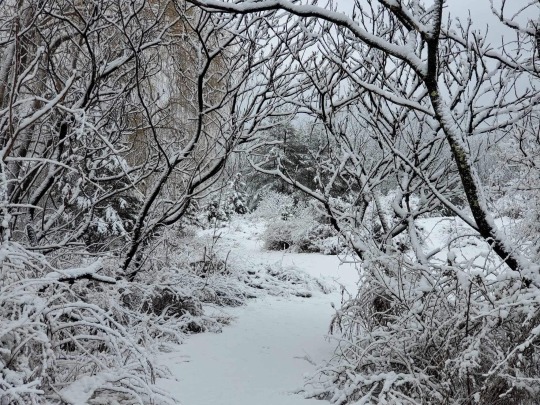


#duke divinity#reformed#duke#notre dame fighting irish#church#photography#food#oishi#waffles#winter#writing#female writers#mango#trees#art
1 note
·
View note
Text

25 posts!
Wow! 25 posts in 11 years! I'm a snail.
0 notes
Text
Of Loving Grace
Word of the day: Exegesis (rabbit hole)
The Examen
My examen practice is going ok, reviewing the day and looking ahead to the next. Yesterday, and this morning, I went down an exegetical rabbit hole (yes, I do feel that the words are redundant) based on this week's lectionary reading from Mark 16. The controversial inspired or not inspired ending in verses 15-18 were included in the day's reading.
My exegesis cares not a whit about whether it is canonical or apocryphal. I was struck by the meaning of two phrases in the whole as I was giving my own modern translation to the section -- one phrase was easily metaphorical and the other was untranslatable. I was stuck. When you're stuck, that's the sweet part, the part to dive into. Dive in with me!
Here's the original of the pseudo-original:
Mk 16:15-18
Jesus appeared to the Eleven and said to them:
"Go into the whole world
and proclaim the Gospel to every creature.
Whoever believes and is baptized will be saved;
whoever does not believe will be condemned.
These signs will accompany those who believe:
in my name they will drive out demons,
they will speak new languages.
They will pick up serpents with their hands,
and if they drink any deadly thing, it will not harm them.
They will lay hands on the sick, and they will recover."
Excerpts from the Lectionary for Mass for Use in the Dioceses of the United States of America, second typical edition © 2001, 1998, 1997, 1986, 1970 Confraternity of Christian Doctrine, Inc., Washington, DC. Used with permission by University of Notre Dame, but not by me. I cut-and-pasted this whole thing from an email. All rights reserved. No portion of this text may be reproduced by any means without permission in writing from the copyright owner. Go ahead, quote me on the ethics of it.
Here's mine:
Live in the world in a way that other creatures will experience the gospel.
Respond to God in the way that Jesus did,
or don't choose to be with God.
Those who respond to God will help to eliminate injustice, depression, and the ills of those around them,
they will speak love to those who don't know it.
They will handle the sly,
and ...
The Sweet Part
Time to jump into the Blue Letter Bible to examine Strong's words. What was going on in this addendum to Mark? Poison? Really? Parasitic water?
Ok, I could have skimmed over it and said, "If they experience hate they will not be discouraged" or something, but no. What's going on in the Greek?
Lest you think I ignored something else that was obvious, I had already peeked at "serpents," G3789, or "ophis." Could it mean snake? Yes. Could it also mean clever or sly? Of course. Keep the actual snakes outside, please.
The trickier phrase about drinking deadly things needed some work. "Drink" is G4095, which could literally mean to imbibe but could also mean to take in either literally or figuratively. "Deadly" is G2286, which is related to G2288, or thanatos. Thanatos, people! "Partaking of the nature of death" is the way bluebible.org said it. "Harm/hurt" is G984, or blapto, which does mean to physically injure, but also TO HINDER.
So, we have "figuratively taking in the nature of death but not being hindered." Awkward. What would the "nature of death" be that we would be figuratively taking in? This morning, that poison is negativity. Negativity about the gospel. Negativity about the faith. Negativity about God's word being trustworthy, and the relationship that is ours with the Lord, and about how we don't really need anyone but ourselves. We are immersed in this negativity that daily tries to poison us, to hinder us and keep us from being who we need to be as we reflect our faith to those around us. Let's finish my modern translation.
They will handle the sly, and if they experience negativity toward their experience with God, they will not be deterred.
They will affect all who are wanting in any way, and all will no longer want.
And this, my friends, is the Shepherd's prayer.
Psalm 23:
The Lord is my shepherd; I shall not want.
He maketh me to lie down in green pastures: he leadeth me beside the still waters.
He restoreth my soul: he leadeth me in the paths of righteousness for his name’s sake.
Yea, though I walk through the valley of the shadow of death, I will fear no evil: for thou art with me; thy rod and thy staff they comfort me.
Thou preparest a table before me in the presence of mine enemies: thou anointest my head with oil; my cup runneth over.
Surely goodness and mercy shall follow me all the days of my life: and I will dwell in the house of the Lord for ever.
Winter Bird:
A bird on my deck, eating my lovebird's leftovers, in January. The Lord provides. The Lord makes a way. When we are in the cold winter, in the valley, experiencing a negative season, we will be refreshed, nourished, and cared for.
Here's a good point-counterpoint about the addendum in Mark:
.
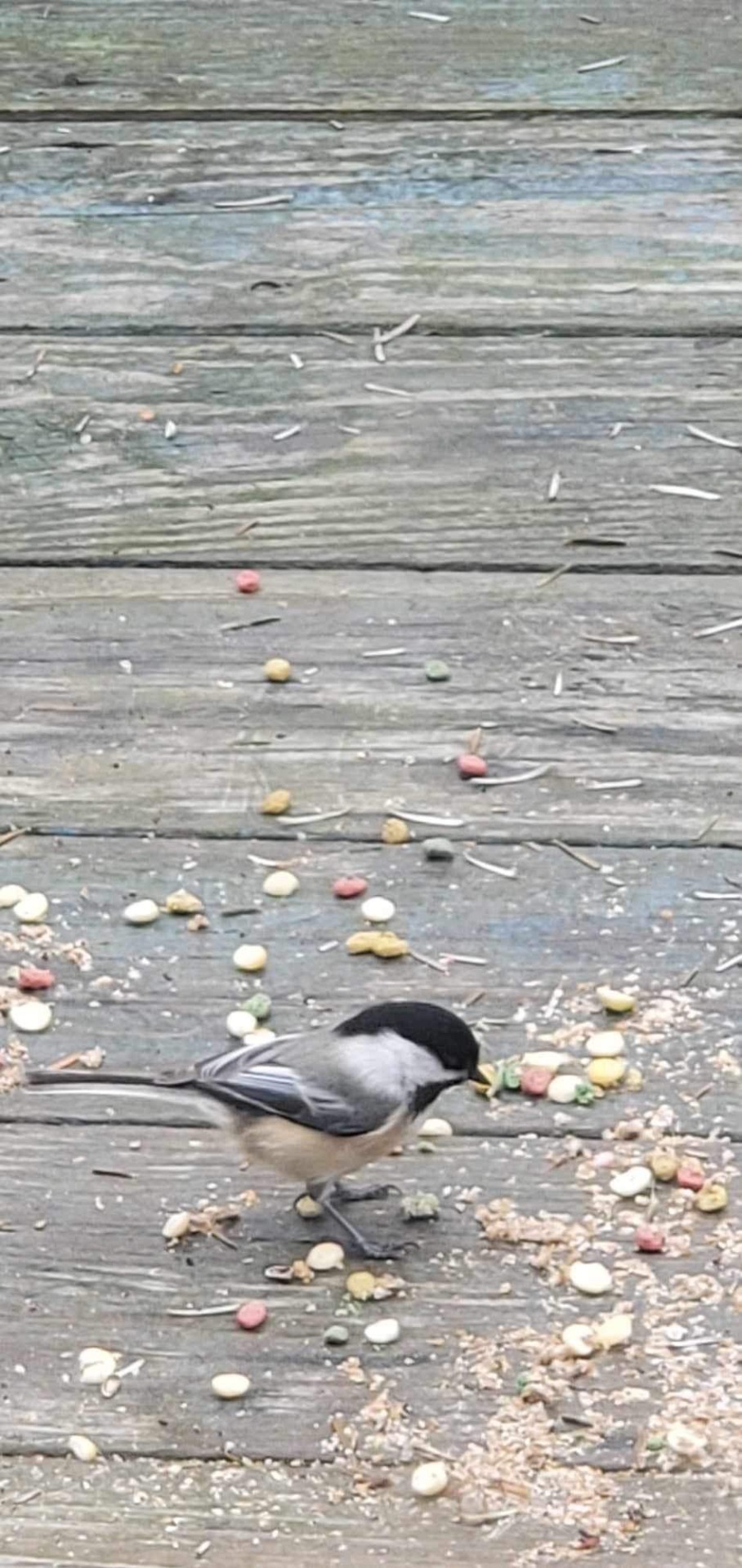
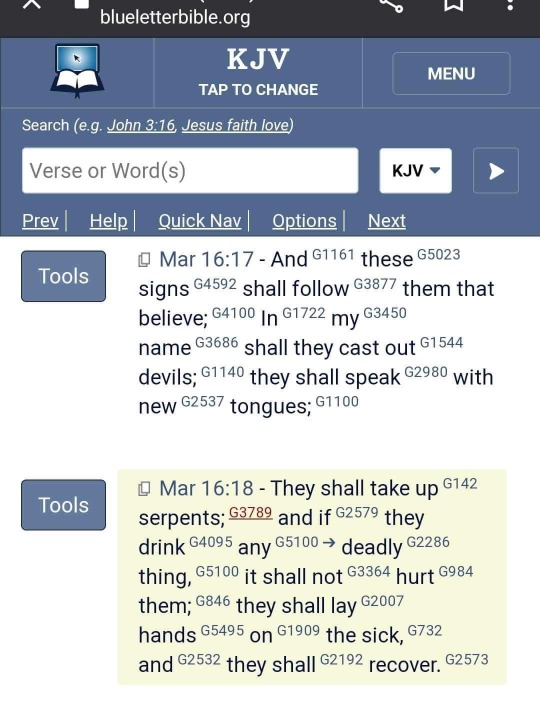
#duke divinity#duke#reformed#church#notre dame fighting irish#birds#bird photography#birdwatching#gospel
0 notes
Text
Of Loving Grace
Word of the Day: Comfort
The Examen
My prayer and meditation time has focused lately on food security and comfort items. I am grateful to have sustenance and also flavor. Moments of safety and love in my life can add nuances to the flavor -- what was once a tolerance can become a fondness with a memory or a feeling to accompany it.
Coincidentally, my spiritual formation class the next day talked about comfort foods. We are embodied creatures (apparently "embodied" is a buzz word in theological circles now) and we need food. Our response to God and with God includes The Meal. Here are two meals that brought comfort to my family this week: homemade bread reminds me of my grandmother, baking for my children, and warm homes during cold winters; while huevos rancheros with salsita make my husband feel loved and full.
2 Corinthians 1:3-4
3 Praise be to the God and Father of our Lord Jesus Christ, the Father of compassion and the God of all comfort, 4 who comforts us in all our troubles, so that we can comfort those in any trouble with the comfort we ourselves receive from God.


0 notes
Text

Of Loving Grace
Word of the day: Thankful
Welcome to day 6 of this meditative series.
The Examen
During the "thankful" part of my examen prayer yesterday, this song came to me from my children's childhood: the Johnny Appleseed song. The lyrics were in a children's book and I sang them to my kids with the melody based on a distant memory from Girl Scout camp or VBS. I found out later that the melody I sang to them is not the melody associated with the lyrics. Canadian composer Rebekah Maxner and I compared tunes when she released her arrangement for students. How fun for me to chat with Rebekah!
Yesterday was snowy and cold in upstate New York, but my black golden doodle curled herself into a ball next to the cozy woodstove (after I chased her off all the furniture). She reminds me that, even though I may not have all I want, I have what I need. Sometimes, even if I don't have all that I need, even though my farmhouse is still cold because the frigid winds blow, I still have the love of God. The Lord is good to me, and so I thank the Lord for giving me the things I need -- the sun, the rain, and the appleseed.
When singing to my darling children, I couldn't ever sing the words properly. I always forgot the "rain" and sang "moon," instead, because Sun and Moon go together, a yin-and-yang, salt-and-pepper, day-and-night correlation. In my imperfection with the lyrics, I can still represent something good - creation. I can still reflect the goodness of God, and share it with my beloved. I share it with you, now, Beloved.
My version, then Disney's, then check out Rebekah's and maybe buy it!
youtube
#duke divinity#duke#reformed#church#notre dame fighting irish#youtube#piano#piano music#devotional#daily devotional#farmhouse#golden doodle
0 notes
Text

Photo taken 1/12 in Virginia, US. Altered.
Of Loving Grace
Word of the day: Spirit
The Examen
Using the examen prayer model, we first thank God for blessings, but then we ask the Spirit to illuminate our lives for examination. Just as we pray for illumination when we approach Scripture, we can ask God to illumine the parts of ourselves and our relationship with God that are pleasing AND the parts that need a little work. We can't fix what we don't know is broken.
It seems like we should know what is broken about ourselves, but I do know that I can hide my deepest issues from even myself. Praying during this portion of the examen is a way of keeping myself honest. There are many things I reflect on about myself with God that are GOOD. God makes all things Good, so I trust that I am Good. But, I take on Bad sometimes, and this is a moment in my day where I can acknowledge that Bad and, if I have the energy, ask God to help me discern what I should do to address it. Can I address it? Is there a way, any way at all, that I can make a bad situation or personality quirk or poor decision somewhat better?
Is there a way that I can offer myself grace the way God does?
For this part of the meditation, I begin with this prayer that I've heard my home church choir sing so often that I hear their voices, and not the voices on the video, when I pray. They sing it at a tempo closer to 1.25x, and that's how I situate myself in this musical prayer for illumination.
youtube
0 notes
Text
Of Loving Grace
Word of the day: failure
The Examen
I did a quick turnround on the prayer practice yesterday. In the Samford Univ Examen pdf that is free on the internet, the Thankful portion of the prayer stood out to me. I am to be thankful that God has chosen me through Christ -- me, with all of my gifts and all of my failures. God loves an imperfect me. Why am I trying so hard? Who am I trying to impress?
Photo is of my lemur earring, given by my adored daughter one year. We have a long history of loving lemurs, and now we love each other from afar. God has a long history of loving me. I wouldn't say that we are "afar."
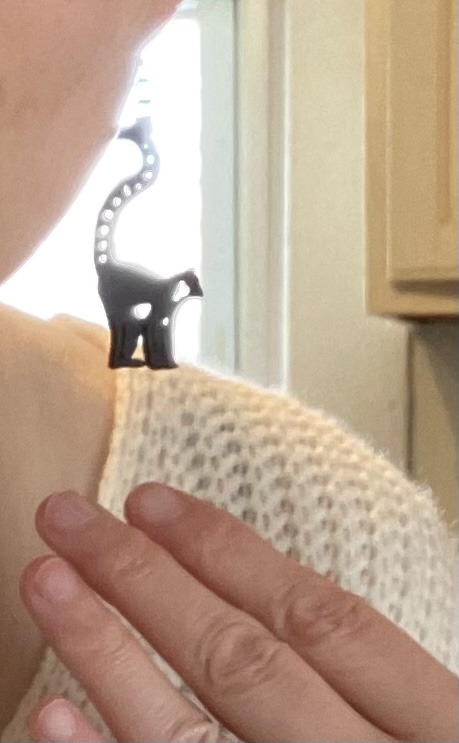
0 notes
Text

Of Loving Grace
Word of the day: Companionship
The Examen
Ok, so I'm figuring out what works for me and what doesn't. I am not entirely responding to the prompts from Samford University, but I prefer them over the Xavier University questions. Yesterday, I did my examen meditation earlier in the day and I was also less grumpy doing it. Is there a causal relationship there? Probably. Is this practice making my journey with God better? The jury is still out.
Why companions? Well, it's cold and snowy and my kids are gone at school or work, and when I have no students, the house is empty but never quiet. This bird, for instance, fights with me all day. I wrestle with handling the noise of his squawks the way Abram wrestled with God. We tango, we adjust, then I give in and let him wound my ears and climb on my shoulder. We aren't walking alone, and we are walking with purpose. Sometimes we know the purpose, sometimes only God does, yet we still keep walking.
Let's go.
1 note
·
View note
Text
Of Loving Grace
Today's word: Trust
The Examen
I am still not enamored with this practice. It isn't a bad practice, but I am unsure of how it will make my life in ministry better. However, let's get off that and delve into the picture, which was one illustration of a time during the day that I gave thanks to the Lord.
We went into this empty Dominican restaurant with low hopes of finding vegetarian food. We ended up with beans, rice, sweet plaintains, and salted yucca. We decided to trust, or maybe just overlook, that the beans were not cooked in pork or chicken broth. I mean, they probably were, but people offer beans soaked in broth without chunks of meat in good faith. After 30+ years of eating vegetarian, we decided to go with it and thank God for the food provided. Sometimes, respecting the spirit of the offer and the resources that are available are the most sincere form of interaction I can hope for. Also, we wanted the guy's place of employment to stay open, so we forked over some cash and bought the food. Delish!
You KNOW I wanted to add aguacate to this dish, being the border girl I am. I took the leftovers home and did just that.

0 notes
Text
Of Loving Grace:
A Series of Meditations on Religion, Art, & Music
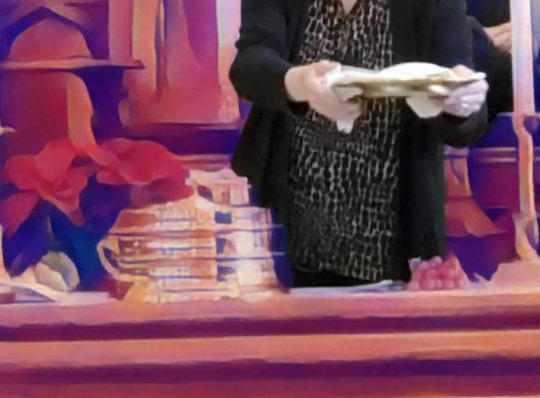
Today's word: Communion. Photo taken 1/14/24 and altered.
Beginning Examen Response on Sunday, Jan. 14, 2024
The Examen as a Self-Meditation Response to God; is the Examen a Prayer?
A meditation and a prayer to God -- these phrases can indicate two actions, or a single, circular action. Considering the latter first, does God accept one's personal musings as a form of communication? If so, then the Examen functions as prayer. Does personal musing make one's understanding clearer so that a post-meditation prayer directly involving God is more beneficial to a conversation with God than a pre- or non-meditation prayer? If it does, does that action of meditation constitute a prayer on its own? Or, considering the first phrase above, if the exercise of the Examen merely leads one through a job-performance review of the day, is that review acceptable to God as prayer? The heart of this question is really this: If you, Christian leader, are not fully communicating with God in the moment, in nearly every moment, then what are you really doing?
For my first day of this practice -- in response to Term 5 of 11 required terms of Spiritual Formation class, which may or may not be a means for my seminary to pad the number of credits needed to graduate, thereby adding an entire year of additional tuition to the coffer -- I used materials from Xavier University and Samford University and found that those from Samford University were more inviting because they offered more guidance and less enigmatic vocabulary to a new Examen practitioner. My first reactions to following a written guide for the Examen include:
Frustration -- why did I think this would be better than my first experience with this practice last year, which I did not find helpful? I misunderstood the nature of the Examen, even after investigating the practice for use this term. I was probably deciding on a practice in a hurry and on deadline, and my friend's previous positive experience inspired me to look for the positivity, also. However, I currently dislike that it is called a prayer when it is clearly a means for inward looking rather than for conversation with God, which is my primary definition of prayer; and
Impatience -- I remember now that I already feel connected with God in a manner that these "prayer prompts" in the Examen are intended for one to achieve. The prompts used on Jan. 14 seemed written for those seeking to feel God in a fundamental, or cursory, way. Throughout my day, I already respond to God and to my internal reflection on these subjects in deeper ways; deliberately re-doing responses feels artificial and redundant -- two factors which make me uncomfortable.
While sitting in reflection/prayer (I am leaving it open to definition while heavily leaning to one side) at the end of Day 1, I decided to add a photo taken each day that reminds me of a time during the day in which I felt the peace of Christ or the love and presence of the Triune God. I will also add a word or simple phrase. A final project may include the photos or the phrases. What will inspiration bring?
The links I used:
THE DAILY EXAMEN https://www.samford.edu/worship-arts/files/The-Daily-Examen.pdf
#duke divinity#art#reformed#church#notre dame fighting irish#duke#spiritualgrowth#spiritual practices
0 notes
Text
Morning Meditation
Luke 9:43b-45
While they were all amazed at his every deed,
Jesus said to his disciples,
"Pay attention to what I am telling you.
The Son of Man is to be handed over to men."
But they did not understand this saying;
its meaning was hidden from them
so that they should not understand it,
and they were afraid to ask him about this saying.
I feel the dread the disciples felt. The knowledge that all around me something good is happening, but examining it is too much for me right now.
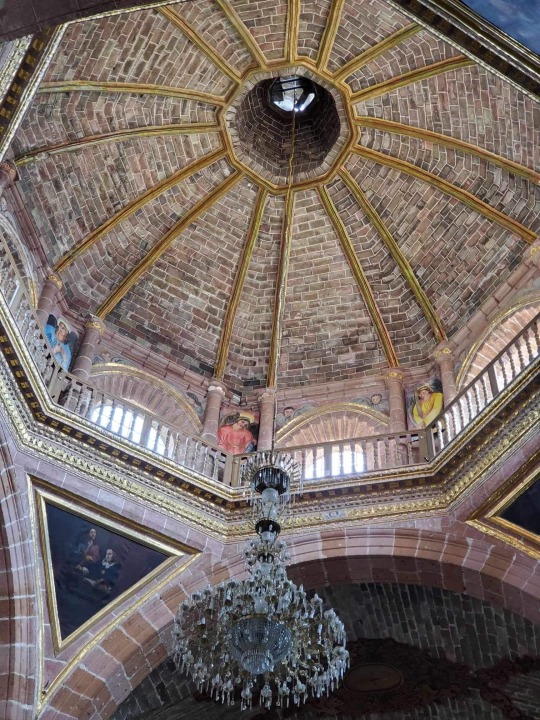
There is so much beauty within reach, yet so much emptiness, too. Can I stay in my little corner of the infinite circle?
The disciples were amazed, but when Jesus tried to tell them to listen and focus, the meaning was hidden from them. Why did Christ call them to attention, while, simultaneously, the Spirit hid the meaning from them?
They saw the deeds, they could not understand the words, and they felt uncomfortable asking about it. Were they afraid in the sense of being shy around the teacher, not wanting to look stupid? Or was there more to it? Did they DREAD the implication of the words the way I immediately identified dread in my chest as I read today's scripture? Was it easier to pretend that nothing bad could change the good they were living?
It is so much easier to live with my head in the sand, to close my eyes to pain I see around me and pain I feel. Emptiness, unhappiness are everywhere. It's exhausting being in this world of misery. I want to look for the amazing and keep my focus wherever I find it, but circumstances pull me back and tell me to focus. The truth I don't want to face is that faith isn't all pretty words on Sunday, Prayer Pal cards on Wednesday, and worship music with a good beat.
Having faith means holding the joy of neighbor and love of God in the same hands that reach out for help in a desperate need to be held and comforted. The joy is only partnered with the pain. The full experience of God, of Christ, of life as a disciple, as life as a human, is a model of completeness.
But, I don't want the pain. I reject completeness today. I dread following the path set before me. Rejection stings, physical pain is devastating, the way forward in ministry is not the way to fortune but to lack. Let me be incomplete, is my prayer. Let me see the beauty and avoid the misery!
Like the disciples for whom understanding was withheld only momentarily, I see now that I, too, am a disciple.
I am amazed by Christ's deeds. I see that wisdom exists but it is not yet mine. I see my imperfection that matches the imperfection of the disciples' and I recognize that Jesus called them as Jesus calls me.
Jesus called them and gave them tasks to do in their imperfection. How can I not also do as I'm called? I can be imperfect and still function.

Where am I in this art? Am I part of the diaconate? Am I the screaming demon of rejection and hate? Am I the bored and cynical saint on the edge who is tired of all my shit? Am I the imperfectly laid bricks that still function to uphold beauty and history? Am I a tiny, marred, dull crystal whose task is to shine whatever light I am able? Am I some of the crumbly mortar?
The disciples' tasks of instructing on the gospel and living a new life led to pain but also to joy. Christ's disciples were called into a complete experience, one of life with faith. Their dread did not stop them from serving as they were called to serve, and as they were sent to serve, and over time their understanding of Jesus's words became more clear. When the Son of Man was handed over to humanity's evils, there was completeness. The joy and the pain were joined hand in hand. The sacred and the human were one. Task accomplished.

La Parroquia de San Miguel de Allende, Mexico. Photo from July 2023. From the corners to the saints, we are all invited to the feast of life in Christ.
This reflection leaves Christ dwelling in the misery of humanity, not yet resurrected. We are still in the place of dread. We can hold time here if we need to. It's because of the disciples who accomplished their tasks while still imperfect and fearful that we know the rest of the story of Christ's resurrection. When we are ready, we can move to completion.

Art shop in Guanojuato, Mexico. The crosses with the imprint of Mexican culture let us know that the disciples' tasks were completed -- the gospel traveled the world even through the imperfect evils of humanity, so that all may know the Joy. We look forward to the New Creation when the evils of colonization, injustice, and greed are vanquished and Joy remains.
Tiny Buddha shares more wisdom to end our reflection and speak to our human dread. While we look forward to fully revealed wisdom and completeness, we can accept the love offered to the disciples and to ourselves by Christ and know that we were always enough.
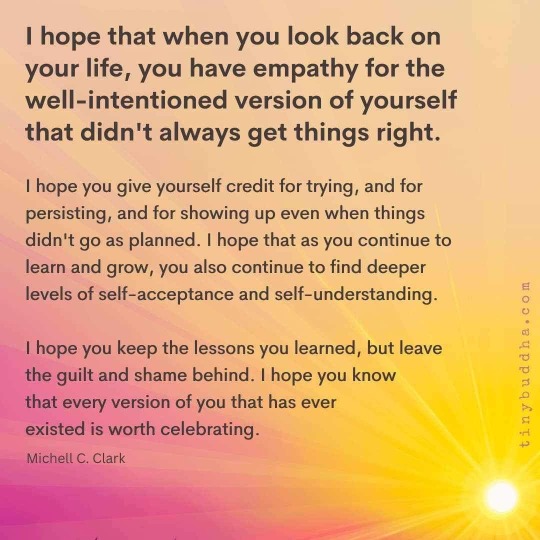
#duke divinity#art#history#duke#architecture#church#tiny buddha#mexico#reformed#christian living#christian faith#christian doctrine#christianity#notre dame fighting irish#university of notre dame
0 notes
Text
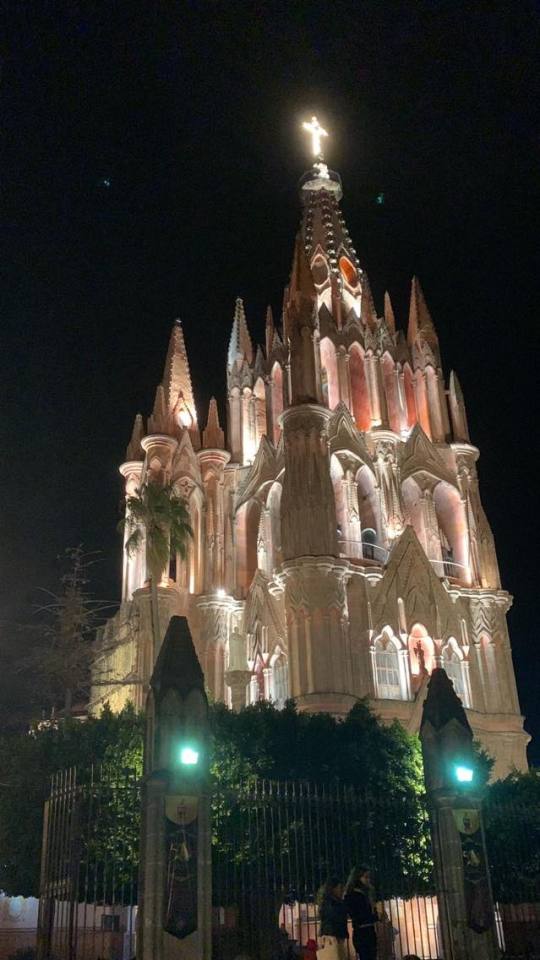
Parroquia de San Miguel Arcángel, Mexico. Photo taken July 2023
0 notes